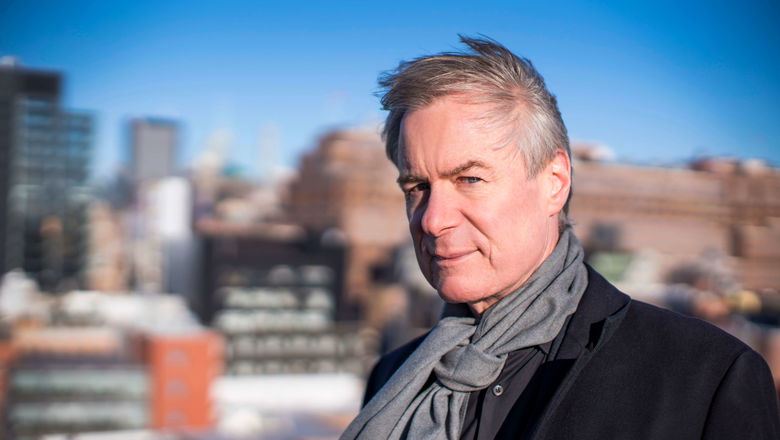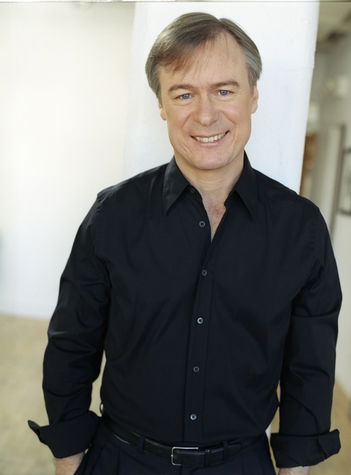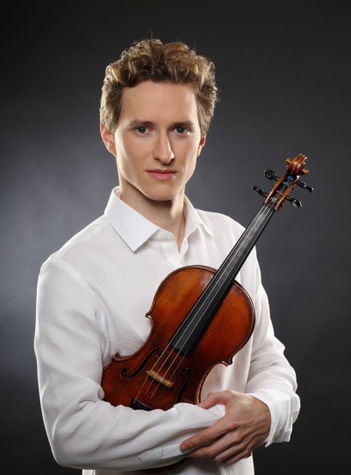Programme
Miroslav Srnka
Superorganisms (European premiere)
Leoš Janáček
The Wandering of a Little Soul, concerto for violin and orchestra
Antonín Dvořák
Mazurek for Violin and Orchestra in E minor Op. 49
Josef Suk
Praga, symphonic poem Op. 26
Secure your seat for the 2025/2026 season – presales are open.
Choose SubscriptionThe closing concert of the Prague Spring is devoted to works by Czech composers in the year we mark Bedřich Smetana’s double anniversary and also celebrate the Year of Czech Music. We can look forward to classics Antonín Dvořák, Josef Suk and Leoš Janáček. Yet we won’t only be stepping back into the past: the programme also contains the European premiere of the piece Superorganisms, which Miroslav Srnka wrote as a commission from no less than five world orchestras.
Others | Duration of the programme 2 hours
Miroslav Srnka
Superorganisms (European premiere)
Leoš Janáček
The Wandering of a Little Soul, concerto for violin and orchestra
Antonín Dvořák
Mazurek for Violin and Orchestra in E minor Op. 49
Josef Suk
Praga, symphonic poem Op. 26
Josef Špaček violin
David Robertson conductor
Czech Philharmonic

David Robertson conductor

David Robertson – conductor, artist, thinker, and American musical visionary – occupies some of the most prominent platforms on the international music scene. A highly sought-after podium figure in the worlds of opera, orchestral music, and new music, Robertson is celebrated worldwide as a champion of contemporary composers, an ingenious and adventurous programmer, and a masterful communicator whose passionate advocacy for the art form is widely recognized. A consummate and deeply collaborative musician, Robertson is hailed for his intensely committed music making.
Building upon his dynamic association with The Metropolitan Opera, Robertson conducts the Met’s 2019/2020 season opening production of The Gershwins’ Porgy and Bess, directed by James Robinson, and featuring Eric Owens and Angel Blue. On the podium for all fourteen performances of the opera, through early February 2020, David Robertson also returns to the Sydney Symphony Orchestra to complete his 2019 valedictory season as Chief Conductor and Artistic Director with American and French music of the 20th and 21st centuries. Robertson will continue to conduct the Sydney Symphony Orchestra in future seasons as the city undertakes a major renovation of its beloved Sydney Opera House.
In Fall 2019, David Robertson joins the newly formed Tianjin Juilliard Advisory Council, an international body created to guide the young Chinese campus of the Juilliard School, complementing his role as Director of Conducting Studies, Distinguished Visiting Faculty. In the 2019/2020 season, Robertson continues his prolific collaboration with composer John Adams, conducting performances of his opera-oratorio El Niño with the Houston Symphony. In addition to numerous international musical endeavors this season, Robertson returns to the Staatskapelle Dreden and Czech Philharmonic, and conducts the Netherlands Radio Philharmonic Orchestra, the New Japan Philharmonic, and, in New York, The Juilliard Orchestra at Carnegie Hall.
In 2018, David Robertson completed his transformative 13-year tenure as Music Director of the St. Louis Symphony Orchestra, where he solidified the orchestra’s status as one of the nation’s most enduring and innovative. For the SLSO, he established fruitful relationships with a wide spectrum of artists, and garnered a 2014 Grammy Award for Best Orchestral Performance for the Nonesuch release of John Adams’ City Noir. Completing the historic Robertson-SLSO association, two final recordings were released in 2019: Wynton Marsalis’ Swing Symphony, with the Jazz at Lincoln Center Orchestra with Wynton Marsalis, on Blue Engine Records; and Mozart Piano Concertos, No. 17 in G Major, K.453 and No. 24 in C Minor, K.491, with Orli Shaham, on Canaray Classics.
In addition to Sydney and St. Louis, Robertson has served in artistic leadership positions at musical institutions including the Orchestre National de Lyon, and, as a protégé of Pierre Boulez, the Ensemble InterContemporain, which he led on its first North American tour. At the BBC Symphony Orchestra, he served as Principal Guest Conductor. Robertson has served as a Perspectives Artist at Carnegie Hall, where he has conducted, among others, The Met Orchestra, the Lucerne Festival Orchestra, and the St. Louis Symphony Orchestra. He appears regularly in Europe with the Royal Concertgebouw Orchestra, the Czech Philharmonic, the Symphonieorchester des Bayerischen Rundfunk, the Dresden Staatskapelle, and at the Berlin Festival, the Edinburgh Festival, the BBC Proms, and the Musica Viva Festival in Munich.
Robertson’s longstanding relationship with the Met Opera includes the premiere of Phelim McDermott’s celebrated Spring 2018 production of Così fan tutte, set in 1950s Coney Island. Since his Met debut in 1996, with The Makropulos Case, he has conducted a breathtaking range of Met projects, including the Met premiere of John Adams’ The Death of Klinghoffer (2014); the 2016 revival of Janáček’s Jenůfa, then its first Met performances in nearly a decade; the premiere production of Nico Muhly’s Two Boys (2013); and many favorites, from Mozart’s Le Nozze di Figaro to Britten’s Billy Budd. Robertson has frequent projects at the world’s most prestigious opera houses, including La Scala, Théâtre du Châtelet, Bayerische Staatsoper (orchestra), the San Francisco Opera, and the Santa Fe Opera.
Robertson is the recipient of numerous musical and artistic awards, and in 2010 was made a Chevalier de l’Ordre des Arts et des Lettres by the Government of France. He is devoted to supporting young musicians and has worked with students at the festivals of Aspen, Tanglewood, Lucerne, at the Paris Conservatoire, Music Academy of the West, and the National Orchestral Institute. In 2014, he led the Coast to Coast tour of Carnegie Hall’s National Youth Orchestra of the USA.
Born in Santa Monica, California, David Robertson was educated at London’s Royal Academy of Music, where he studied horn and composition before turning to orchestral conducting. He is married to pianist Orli Shaham, and lives in New York.
Josef Špaček violin, guest artist

“Working with Josef Špaček is amazing. He is a wonderful person with good heart. You can feel this in his playing, which is gracious, teeming with emotion. And his technique is marvellous. He is one of the greatest solo violinists of the present time,” says the conductor Manfred Honeck, under whom the young virtuoso has regularly given concerts, in the Czech Television documentary Devět sezón (Nine Seasons) The 2023 film provides an interesting account of Špaček’s life, also shedding light on his nine-year tenure as the Czech Philharmonic’s concert master.
Although not having been a member for several years, Josef Špaček has not ceased to collaborate with the Czech Philharmonic, pursuing numerous joint projects. And even though appearing as a soloist with celebrated orchestras worldwide and as a chamber player at the most prestigious concert venues, he continues to perform in Czech towns and remote villages.
Josef Špaček is a member of the exciting international Trio Zimbalist, giving performances all over the globe. He has regularly appeared in the Czech Republic with the cellist Tomáš Jamník and the pianist Miroslav Sekera, with whom he has created critically acclaimed albums. He has also made recordings with the Czech Philharmonic (featuring Janáček’s and Dvořák’s violin concertos, and Suk’s Fantasy), the Prague Radio Symphony Orchestra, conducted by Petr Popelka (Bohuslav Martinů’s music).
Born in 1986 in Třebíč, Bohemia, Josef Špaček showed his exceptional talent at an early age. Music was a natural part of his childhood (his father has been a cellist of the Czech Philharmonic for over three decades, and his siblings played instruments too), as described by his mother in the book Špačci ve fraku. After graduating from the Prague Conservatory
(under the tutelage of Jaroslav Foltýn), Josef went on to study in the USA, where he attended the Curtis Institute of Music in Philadelphia (his teachers included Ida Kavafian and Jaime Laredo) and The Julliard School in New York (tutored by Itzak Perlman).
After completing his formal education, he returned to his homeland, where he was named the youngest ever concert master of the Czech Philharmonic. At the same time, he performed as a soloist and chamber player, garnering international recognition. A watershed in his career was victory at the Queen Elisabeth Competition in Brussels, whereupon he began receiving invitations from the world’s most renowned institutions. Due to his having an ever more challenging and busy schedule as a musician – and to his family situation, especially following the birth of three children – he resigned from the post of concert master of the Czech Philharmonic so as to focus solely on being a soloist. Owing to his immense talent and great diligence, his childhood dream to become a famous violinist has come to pass.
Miroslav Srnka
Superorganisms
Leoš Janáček
The Wandering of a Little Soul, Violin Concerto
Antonín Dvořák
Mazurek for Violin and Orchestra, Op. 49
The title of the Mazurek for Violin and Orchestra, Op. 49, by Antonín Dvořák makes reference to the Polish mazurka, and it borrows certain elements from that dance, but it is a virtuosic showpiece with two contrasting themes, the first rhythmically bold and second lyrical. The work was written at the suggestion of the publisher Simrock, who asked Dvořák for some sort of smaller-scale work (that would be easy to sell) in the style of the Slavonic Dances. The original version for violin and piano dates from 1879 and was premiered in late March of that year at a concert presented by the Music Department of the Artists’ Society, where the violinist Ferdinand Lachner played it with Zdeněk Fibich. A version for violin and small orchestra soon followed. One proof of fact that a small form does not necessarily mean small importance is the dedication of the Mazurek to the famed violinist Pablo de Sarasate and the inclusion of the composition on several programmes with Dvořák accompanying Lachner during Dvořák’s “farewell tour” in 1892 before his departure for America.
Josef Suk
Praga, symphonic poem for large orchestra, Op. 26
On the 4th of January, a boy was born in Křečovice, a little village 50 kilometres south of Prague. He was given the name Josef after his father. He exhibited musical talent early playing violin, piano, and organ, and he began his studies at the Prague Conservatoire at the age of eleven. First, he studied violin under Antonín Bennewitz, then piano under Josef Jiránek, and composition under Karel Stecker. When he turned seventeen in 1891, the year the previous work on today’s programme was composed, he began his composition studies in the advanced class taught by Antonín Dvořák. Who knows how he took his teacher’s decision to depart for America, but he later became a favourite pupil of Dvořák, a visitor to the composer’s summer residence in Vysoká near Příbram, and an assistant in making piano reductions of the master’s works. It was there that Suk met Dvořák’s daughter Otilie, who later became his wife.
1891 was also the year when a student string quartet was established at the Prague Conservatoire at the initiative of the director Bennewitz and of Hanuš Wihan, the professor of chamber music. Josef Suk played second violin in the quartet. In 1892, the recent graduates began giving concert appearances as the Bohemian Quartet (the Czech Quartet after 1918), and when they thrilled Vienna in 1893, doors were opened to them in Europe, and they became one of the most important chamber music ensembles of their day. Josef Suk played in the Bohemian Quartet for 41 years, almost the entire period of the ensemble’s existence, and in that time he gave more than 4,000 concerts around Europe and all over the world. It is difficult to imagine how Suk managed to compose at all, being enormously busy as a performing artist continually on the road.
Once while on a tour of Spain, he decided to compose a musical depiction of his beloved Prague that would express the city’s greatness and beauty. He chose to make it a symphonic poem, and he composed it between the spring and October of 1904. At the end of the summer, he wrote to his publisher Mojmír Urbánek: “I’m nearly finished with Praga – about four more pages. There won’t be any choir, organ or bells, but it will be lovely even without them.” In an earlier conversation, the pragmatic publisher had apparently persuaded the young composer to avoid the use of excessively monumental forces that would limit opportunities for the work’s performance. Ultimately, Urbánek succeeded only in part – the work does not, in fact, call for choir, but contrary to Suk’s quoted letter, organ and bells are heard at the work’s grandiose conclusion. The Czech Philharmonic gave Praga its premiere with Oskar Nedbal conducting on 18 December 1904 in Pilsen, and it was heard in Prague on 25 March 1905 at the Rudolfinum under the composer’s baton.
The closing concert of the Prague Spring is devoted to works by Czech composers in the year we mark Bedřich Smetana’s double anniversary and also celebrate the Year of Czech Music. We can look forward to classics Antonín Dvořák, Josef Suk and Leoš Janáček. Yet we won’t only be stepping back into the past: the programme also contains the European premiere of the piece Superorganisms, which Miroslav Srnka wrote as a commission from no less than five world orchestras.